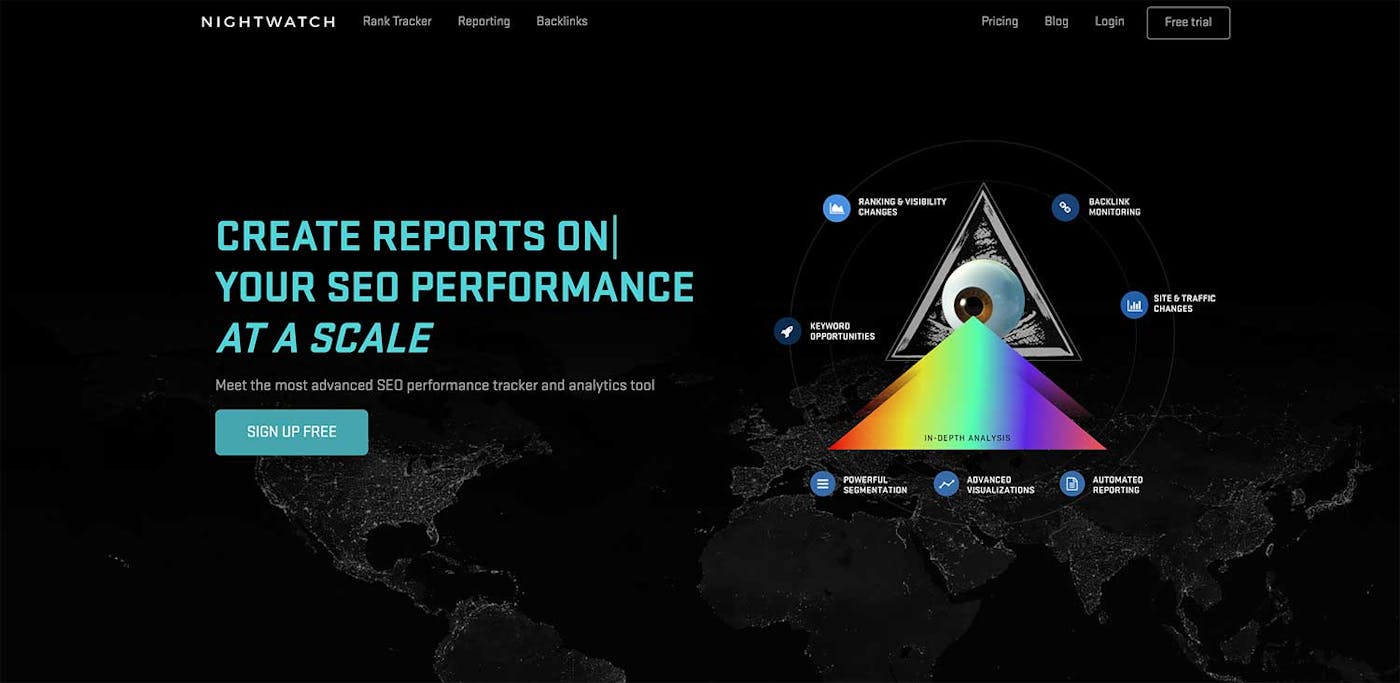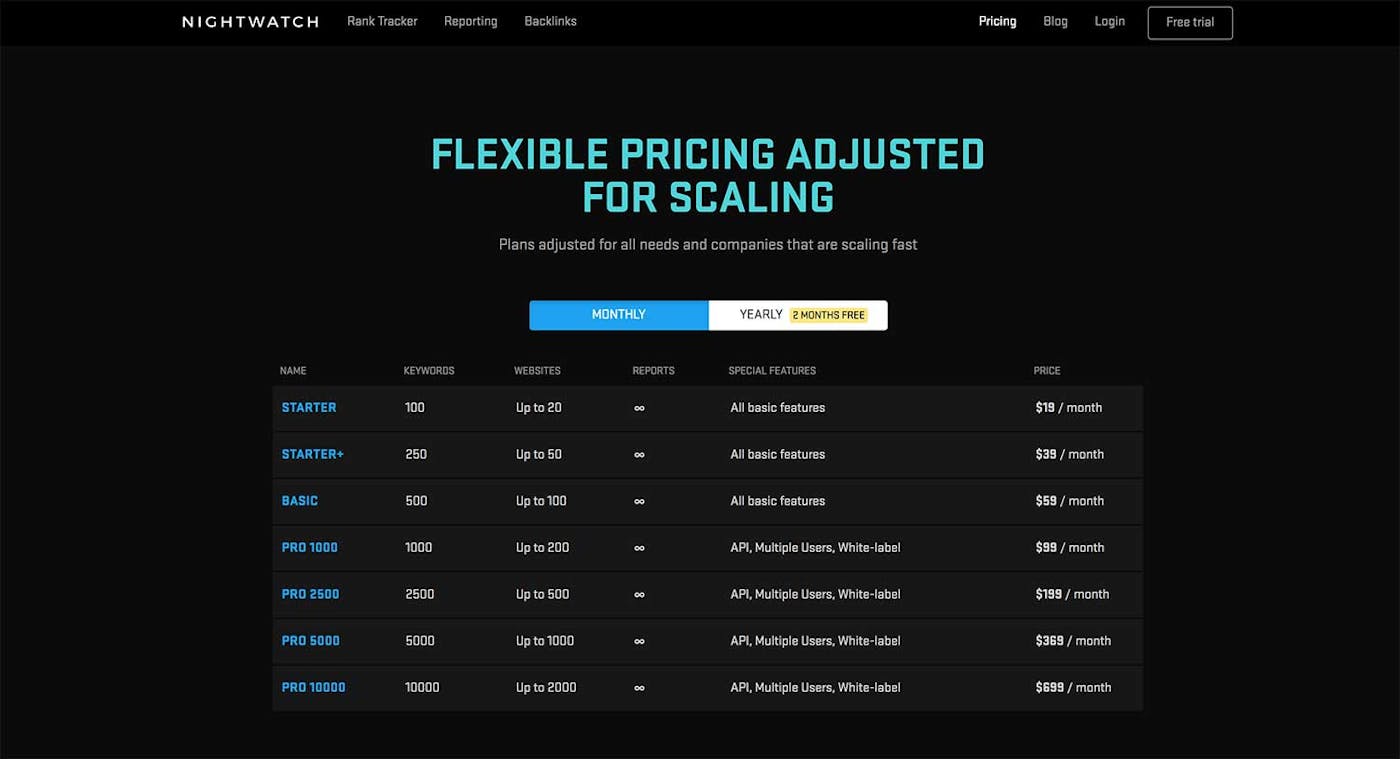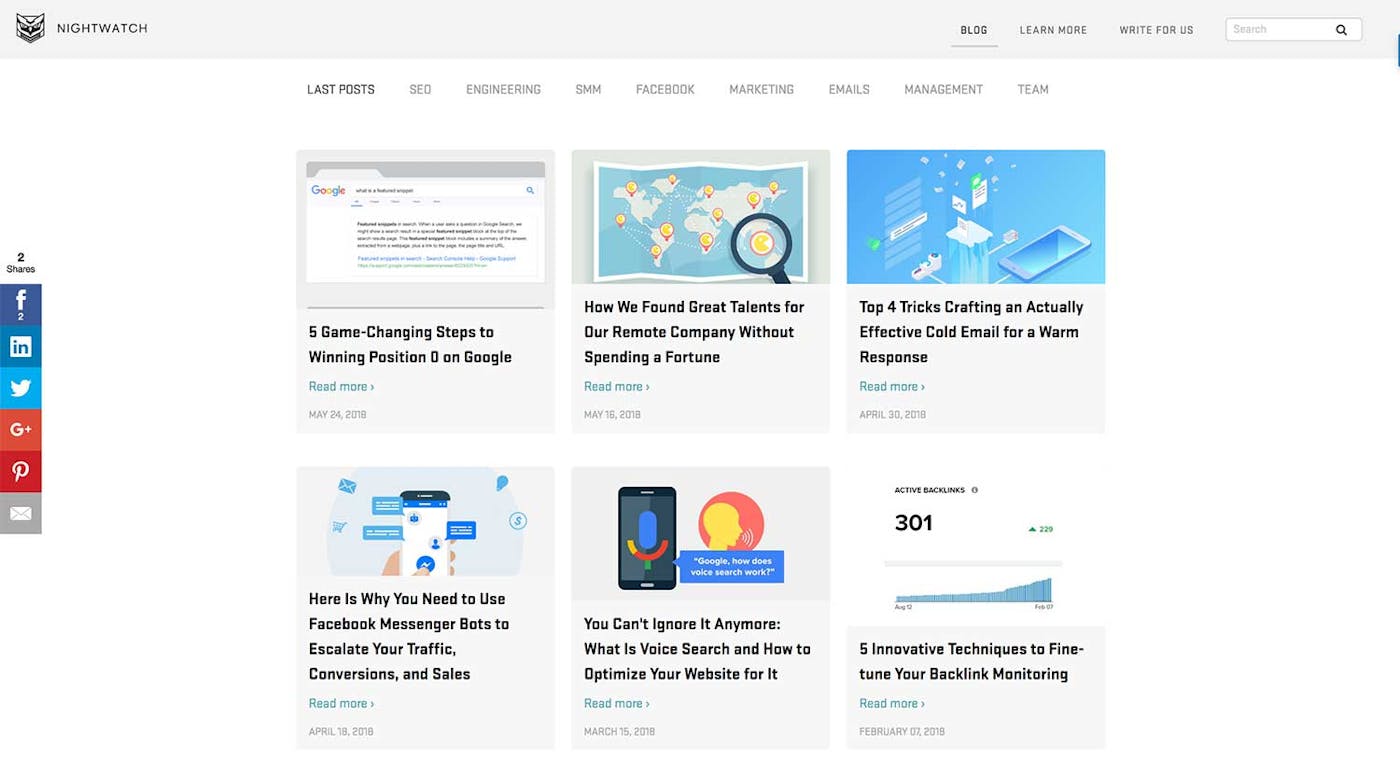How I Built and Began to Grow My Company without Spending My
Savings
Hello! What's your background, and what are you working on?
My name is Aljaž, and I've been in internet marketing for more than ten years. For the last five years, my team and I have been focusing on SEO products.
Our latest creation, Nightwatch, is a search visibility tracker designed especially for marketing agencies and SEO professionals who are tracking large volumes of keywords and high traffic websites. Our users love it because of its slick interface and unique advantages — the tool is exceptionally good with segmentation and visualization of data, sophisticated features such as automatic keyword discovery, smart notifications, customizable reports, and much more.
Our revenue is currently at about $35,000 per month, and it has been growing steadily each month.

What motivated you to get started with Nightwatch?
Nightwatch is actually a successor to our previous tool, RankTrackr, which we started a little over five years ago. At the time, I realized that there was no simple search engine keyword tracker that was reliable, accurate, and good with local search results, or had rankings updated frequently. So I set out to make my own basic rank tracking tool for SEO marketers.
My use case back then was quite specific — I needed a tool to track my many affiliate sites (over 50), which meant that I needed something designed in a way that made it easy to switch between websites and quickly see which of them needed my attention. Being a member of various affiliate and online marketing communities, such as WarriorForum and BlackHatWorld, I knew that a market for this kind of rank tracker already existed. Though, at the time, Moz and a couple of others were a strong presence in the space, the SEO market was much less saturated than it is today.
I didn't have any money saved up that I could invest into development, but I'm a developer myself and I knew that creating a prototype wouldn't take too long. I coded a simple script in Ruby that retrieved rankings from search engines and printed them in the console.
Even though the prototype of RankTrackr was fairly simple, building it out and maintaining it ended up taking more time and effort that I initially imagined. It actually takes a lot of time to maintain the code for retrieving the data from search engines (especially Google) and keeping up with the changes done to the SERP (search engine result page), so I presented the idea to one of my colleagues and invited him to help with the technical aspect of the project.
What went into building the initial product?
The idea for Nightwatch came at the point when we decided we wanted to provide more functionality than just rank tracking. We realized that if we wanted to scale our business up and move on to the next level, we should rebrand the tool and widen the array of functionality we'd been providing with RankTrackr.
We wanted to make a product that would let users monitor their and their clients' website visibility — keyword rankings, backlinks, website pages, changes on the website (indexed pages, CTR changes), aggregate Google Analytics, and Search Console data — while keeping the ability to see an overview of multiple sites so that an agency or user could quickly and easily track progress and changes.
Our code base and the experience we gained from RankTrackr served as a good foundation, but we wanted to improve the development process and technology stack with the infrastructure. At that point, our team expertise was mostly Ruby on Rails, Backbone.js, and Scala, and we wanted to find new technologies that could improve our development speed and reduce maintenance cost. In order to do this, we decided to move from Backbone.js to Ember.js, and abandon our old Scala programs and rewrite everything in Elixir for background processing. The old Scala programs were badly written and too difficult to maintain, so this change made a big difference.
It took us roughly one year to build and release the first version of Nightwatch. We were hoping to move faster, but a core developer ended up leaving the project due to disagreements, at which point we had to reorganize the company and hire new developers, all while still trying to get the hang of the new technologies we were employing. Nevertheless, we persevere and pulled it off with just a few months delay.
How have you attracted users and grown Nightwatch?
In order to promote Nightwatch before launch, we created a special beta launch page that allowed users to apply for a beta invitation to try out the tool. The users who shared the page and invited their friends to join earned additional points, which meant that they received the invitation faster.
This strategy lead to the Nightwatch beta invitation post being shared over 300 times on Twitter, which helped us expand the reach of our promotional activities and attract many new visitors.
We promoted the Nightwatch.io beta page on sites like BetaLaunch and ProductHunt. The best results came through promoting the page to our old RankTrackr's userbase and sharing the information in specialized, closed marketing-oriented groups on Facebook and Linkedin.
What's your business model, and how have you grown your revenue?
We focus exclusively on the SaaS business model. The majority of our recurring subscriptions are monthly, but we try to encourage them to switch to discounted annual subscriptions to save them some money in the long run and get us more money upfront.
With the launch of Nightwatch, we enabled a one-month free beta account for all users. As we hoped, some of the users went on to subscribe to the paid version after their beta trial ended. For some exclusive users, we actually ended up extending the free trial period.
We decided to go for the Braintree payment system since it offers native PayPal integration. Regardless of the downsides, we were able to adjust the system to accommodate our needs and our business model. We needed more flexibility in our billing system, so we are not using the classic Braintree subscriptions to charge users. Instead, we've implemented our own logic for charging users based on the configuration of their plan and features they select.

As previously mentioned, our revenue is currently at about $35,000 per month, and it has been growing steadily each month. Despite that our primary focus over the last two years has been development over marketing, we've been growing at about 40%+ on average on a yearly basis. The biggest revenue growth usually comes from adding major features and promoting them. After their release, we put added effort into communicating the advantages of new features and upgrades so that users opt in.
Business expenses (excluding the salaries) are mostly hosting costs and the costs of running the infrastructure for scraping and processing the data retrieved from search engines and websites. Hosting costs are about $800/month, and the remaining infrastructure and services are roughly $1000/month. We've been able to reduce these expenses over time, but we're always working on ways to bring costs down even more.
What are your goals for the future?
At the moment, our developers are focusing on launching two new big features. The first one is a site audit, which will provide our users with comprehensive reports about their website structure, health, and content and markup optimization. We're dedicating most of our resources to the second feature, which is an improved ability to track all different Google snippets — from organic rank and local pack rankings to zero position and other less common snippets, such as carousels on desktop and mobile devices. We are also adding an ability to preview each SERP response that Google gives for any given specific location, on a country, region, city, or a ZIP code level.
Marketing-wise, we are equipping our team with new members who are focusing on inbound marketing and communication with our existing and potential customers. We've already established a stable workflow and are publishing guest posts and sharing our knowledge on high-authority websites and blogs. Our inbound marketing efforts are evolving, and we are working on a Nightwatch blog that specializes in exceptional SEO, marketing, and business growth content. Our aim is to become one of the most relevant, top-quality blogs in the industry.

One of the bigger challenges that lies ahead is recruiting new remote employees and expanding our close-knit team of six people. We're still figuring out the smartest way to move forward with this aspect so that we can successfully scale up the business and compete with the major players in our industry.
What are the biggest challenges you've faced and obstacles you've overcome? If you had to start over, what would you do differently?
We focused too much and for too long on the development of the product at the expense of marketing and promoting the tool we already had.
Another painful mistake (which we actually made twice) was partnering up with people and companies who were in different sub-niches. We decided to start a partnership with a Dutch company that wanted to specialize in marketing our product in Dutch and German markets, but that decision proved a waste of time and resources. Another unsuccessful partnership was with a company that wanted to adapt our product for a Shopify app, but unfortunately resulted in setbacks and time wasted on both sides. We learned that we needed to be much more careful when deciding who to do business with, and more realistic with the expectations.
We also learned that, when running a successful online business, people will approach you all the time — trying to partner up, offering their services, trying to get you to implement certain features, etc. It's tempting, but in reality, it's almost always better to resist. The aforementioned Dutch marketing company was responsible for bringing us revenue by running their own branded version of our tool (hosted by us) and sharing the profits. We went through extensive modifications of our application to support this, only to realize that our new partners didn't have what it takes to market such a service, and all our efforts had been wasted.
We also came to see that we'd been sticking to traditional Scrum methods for way too long when they didn't really fit out development and planning process. We were trying to fit our work into these development methodology frameworks that we picked up while working for other companies. But in reality, our team tends to rotate between priorities frequently and sometimes pivot them as we go, so classic two week sprints didn't work for us at all. We recently switched to a simple Kanban board, which is a more relaxed way of planning and work tracking that suits our idea of agility much better.
One of the most important lessons for me personally — which I believe pretty much every business owner comes to eventually — is learning how to delegate work.
Have you found anything particularly helpful or advantageous?
What really sets us apart from other similar products is exceptional care for our users. We see it as one of our main competitive advantages. Our users are special and we treat them accordingly, and in return, they will often share what they're struggling with when using the product instead of just canceling their subscription without explanation. Every now and then, we make a list of users who provided valuable feedback and caught important bugs and send them thoughtful gifts.
I really like the book Flow by Mihaly Csikszentmihalyi. It provides some great insight into how to structure your day and design your working habits for maximum effect, and reach the coveted state of "flow. When I drive, I often listen to various podcasts such as Self Made Man, Scaling UP!, and ZenFounder as I find them to be a great source of inspiration and motivation.
What's your advice for indie hackers who are just starting out?
One of the most useful apps that I use for productivity is RescueTime. It allows you to track and analyze how you spend your time on the computer — and trust me, you will be shocked when you realize what you could have done with all the time you inadvertently waste on social media and aimless browsing.
Don't stress yourself with tackling big, far-off, complicated problems or chasing unrealistic revenue expectations. It is more important to focus on solving smaller but significant problems that you are facing here and now, and that you can solve without spending millions on development. The biggest solutions and opportunities will show up along the way, while you've got your head down working on the problems in front of you.
Lastly, when developing a new business, it's extremely important to scratch your own itch. When your business is solving a problem, you have to understand that problem extremely well, and you can only do that only when you've experienced it first hand.
Where can we go to learn more?
To learn more about Nightwatch, visit our website or blog.
You can also follow Nightwatch on Twitter! My co-founder Matic and I (Aljaž) occasionally tweet interesting things.

Stay far away from this company, they conveniently forgot to add a "Cancel Subscription" option to their website and their customer service accidentally forgets to process any cancellation requests. Everything about my experience with Aljaž has been shady. We had to change our our company CC's just to stop them from charging us. You've been warned...
That UI... amazing
Prove me wrong, but you doing scrapping of Google SERP. Isn't thits a violation of Google Terms and Conditions?
It depends on how you are accessing the data.
That's true. Look like Semrush or Moz use toolbars for gathering such data, are you using same approach?
great read ! from where did you get your remote team ?
Great question. You can read an article we wrote for our blog on "How we find great talents without spending a cent": http://blog.nightwatch.io/finding-remote-employees
great one!
May I ask what languages U coded i?
For front end and back end both?
Front-end is Ember.js (just like IndieHackers!). Our APIs are written in Ruby on Rails. Data processing (fetching, scraping, storing) is made with Elixir.
Working now with elixir, it rocks... Congratulations.
Awesome interview, thanks Aljaž. How much time did it take to go from launch to 35k MRR?
It took us roughly 2 about years with the help of converting some of the old clients to Nightwatch
Thank you for the links to podcasts, added them to bookmarks
You're welcome :)
Man, I remember signing up for your beta a while back, and glad I saw this! It's really come quite a ways –congrats to the team! Maybe I'm just missing it, but does Nightwatch have a simple keyword volume search feature, a la Semrush or keywordtool.io? If it did, I think this would become my all-in-one tool. Love the pricing structure, too. I simply can't afford the monthly SemRush Pro level for my needs.
Glad to hear that Peter. We do provide search volume feature -- you can activate the "search volume" columns for every keyword that you're tracking on both local and global levels.
Very insightful article, Aljaž! The pricing table caught my eye because it is not in the typical card style and has many more choices than the typical card style. How did you choose to go with the list style? Have you A/B tested it extensively (or at all)?
Hey Heliodor. Considering different customer requirements we decided to go with the pricing table that has more options. So far it's been working good, but we also plan on testing a customizable plan options in the future.